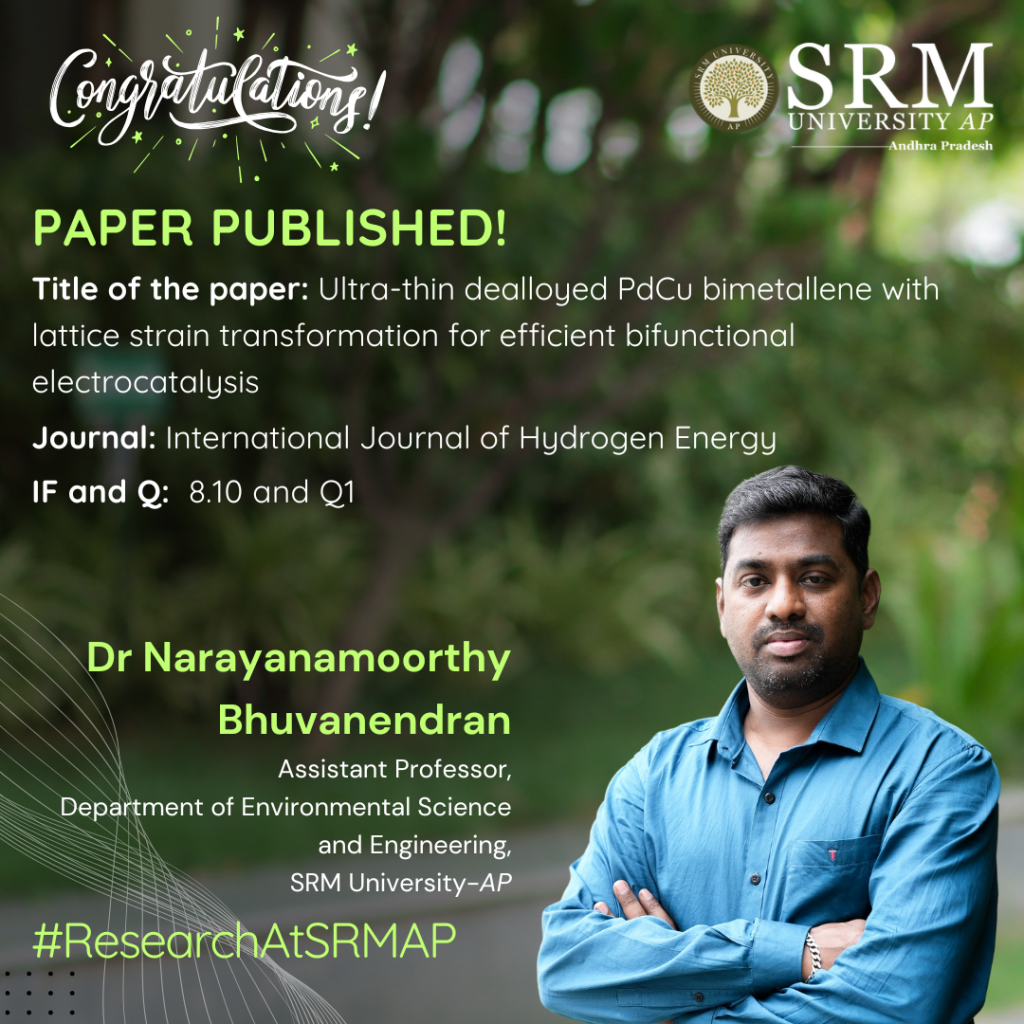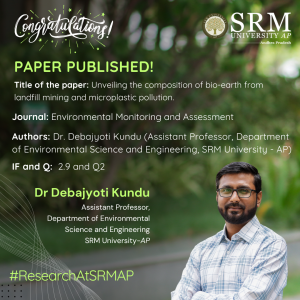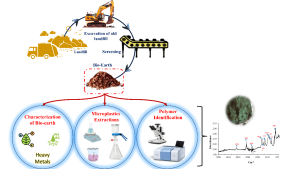Current Happenings ENVS News
- 2D Metallene Designs to Advance Multifunctional Electrocatalysis January 6, 2025

Dr Narayanamoorthy Bhuvanendran, Assistant Professor in the Department of Environmental Science and Engineering, has published his research work as an article titled “Ultra-thin Dealloyed PdCu Bimetallene with Lattice Strain Transformation for Efficient Bifunctional Electrocatalysis” in the esteemed International Journal of Hydrogen Energy, which has an impact factor of 8.10. His work underscores the development of 2D PdCu bimetallene with improved structural and electronic properties displaying super-catalytic behaviour.
Abstract
Two-dimensional (2D) PdCu bimetallene (PdCu) demonstrates exceptional structural and electronic properties, making it highly effective for electrochemical reactions in energy applications. Electrochemical dealloying (DA) of PdCu enhances surface reactivity by modulating electronic structure and inducing strain, optimising its performance for oxygen reduction (ORR) and methanol oxidation (MOR) in alkaline media. DA PdCu features a heterogeneous surface with abundant defects, improving active site availability and reaction kinetics. It achieves superior ORR mass activity (0.62 mA µg⁻¹) with a 10 mV positive half-wave potential shift after 20,000 cycles and MOR mass activity (3335.9 mA mg⁻¹) with 62.3% retention after 10,000 cycles. Theoretical studies reveal the impact of strain-induced electronic modulation on intermediate adsorption energies, corroborating experimental findings. This alloying-dealloying strategy in 2D PdCu bimetallene offers a robust approach to advancing multifunctional electrocatalysis with enhanced durability and performance.
Explanation of the Research in Layperson’s Terms
This research highlights the development of a two-dimensional PdCu bimetallene catalyst with tailored structural and electronic features, offering transformative advancements for electrochemical energy conversion and storage systems. The unique properties of 2D metallene layers, including their high surface area, tunable electronic structure, and enhanced surface reactivity, play a pivotal role in optimising catalytic performance. By employing a controlled dealloying process, the atomic and electronic structure of PdCu bimetallene is significantly modified, introducing lattice distortions, abundant surface defects, and a heterogeneous crystalline-amorphous interface. These features create more active sites and improve the interaction with reaction intermediates, leading to superior catalytic behaviour. The material demonstrates outstanding efficiency in oxygen reduction (ORR) and methanol oxidation (MOR), critical reactions in fuel cells and other electrochemical energy systems. For ORR, the catalyst achieves high mass activity, long-term stability, and resistance to degradation, maintaining its performance after extensive testing. In MOR, the catalyst exhibits exceptional activity and durability, retaining a significant portion of its efficiency over prolonged cycles. These structural and functional attributes emphasize the importance of 2D metallene designs and the alloying-dealloying strategy in enhancing the structure-activity relationship, establishing a foundation for innovative electrocatalysts in sustainable energy technologies.
Practical Implementation/ Social Implications of the Research
This research offers a practical pathway to revolutionise renewable energy systems by advancing next-generation electrocatalysts for fuel cells, metal-air batteries, and other energy conversion technologies. The optimised two-dimensional PdCu bimetallene, with enhanced ORR and MOR performance, demonstrates significant potential for clean energy applications such as proton-exchange membrane fuel cells and direct methanol fuel cells, addressing critical needs for efficiency and durability. The scalable, environmentally friendly alloying-dealloying synthesis reduces reliance on expensive platinum, lowering production costs while delivering high catalytic performance. By enabling efficient energy storage and conversion, supporting carbon-neutral systems, and inspiring the design of versatile 2D metallenes for diverse applications, this research significantly contributes to sustainable energy transitions and global climate goals.
Collaborations
- Prof. Sae Youn Lee, Department of Energy and Materials Engineering, Dongguk University, Seoul, Republic of Korea.
- Dr Wan-Gil Jung, Korea Basic Science Institute, Gwangju Center, Republic of Korea.
- Prof. Ming-Chang Lin, Department of Applied Chemistry, National Yang-Ming Chiao Tung University, Hsinchu, Taiwan.
- Dr Venkatesan Srinivasadesikan, Department of Chemistry, School of Science and Humanities, Vignan’s Foundation for Science, Technology and Research, Guntur, Andhra Pradesh, India.
Future Research Plan
Future research will focus on designing nanostructured hybrid electrocatalysts with enhanced activity, stability, and selectivity for energy and environmental applications. Emphasis will be placed on tailoring nanoscale architectures and synergistic material interactions to optimize performance in processes such as water splitting, CO2 reduction, NO3 reduction, fuel cells, and pollutant degradation, enabling scalable and sustainable solutions to global challenges.
Continue reading → - Unveiling Microplastic Pollution in Landfill-Mined Bio-Earth December 26, 2024
 Dr Debajyoti Kundu, from the Department of Environmental Science and Engineering, has conducted pioneering research on the composition of bio-earth recovered from landfill mining at the Bhandewadi landfill in Nagpur, India. His study, Unveiling the Composition of Bio-Earth from Landfill Mining and Microplastic Pollution, reveals the presence of microplastics in bio-earth, raising concerns about its safety for agricultural use. The research underscores the importance of addressing microplastic contamination to ensure the sustainable application of landfill-mined materials in agriculture.
Dr Debajyoti Kundu, from the Department of Environmental Science and Engineering, has conducted pioneering research on the composition of bio-earth recovered from landfill mining at the Bhandewadi landfill in Nagpur, India. His study, Unveiling the Composition of Bio-Earth from Landfill Mining and Microplastic Pollution, reveals the presence of microplastics in bio-earth, raising concerns about its safety for agricultural use. The research underscores the importance of addressing microplastic contamination to ensure the sustainable application of landfill-mined materials in agriculture.A Brief Abstract:
This study explores the composition of bio-earth derived from landfill mining at the Bhandewadi landfill, Nagpur, India, and investigates the presence of microplastics within it. The bio-earth was characterized by key parameters such as moisture content, organic carbon, nutrient levels, and heavy metal concentrations. Microplastic contamination was also assessed using ATR-FTIR spectroscopy, revealing a significant presence of microplastics in the bio-earth. The findings highlight the need for further research and strategies to mitigate microplastic pollution to ensure the safe use of bio-earth in agricultural applications.
Explanation in layperson’s terms:
In this study, we looked at bio-earth, which is a material recovered from old landfill sites, and examined its quality and the presence of harmful microplastics. Landfill mining is an emerging technique that helps recover valuable resources from old waste. Bio-earth is often used as a natural fertilizer, but the problem is that it can contain tiny plastic particles (microplastics) which can harm the environment. Our research found that the bio-earth from a landfill in Nagpur, India, had both useful nutrients for plants and significant levels of microplastics. This is concerning because it could affect the safety of using such material in farming or gardening. Our work suggests that more research is needed to figure out how to remove these plastics and make the bio-earth safer for agricultural use.
Practical Implementation:
The findings of this research have significant implications for environmental management and waste recycling. The presence of microplastics in bio-earth poses risks to soil health, plant growth, and potentially to human health when used in agriculture. The research highlights the need for proper waste management techniques to reduce microplastic contamination and improve the safety of recycled materials like bio-earth. This study also calls for developing strategies to remove or reduce microplastics from landfill mining processes, ensuring that bio-earth can be used safely as a fertilizer or soil conditioner without further environmental harm.
Collaborations:
This research was conducted through collaboration between several esteemed institutions:
CSIR – National Environmental Engineering Research Institute (CSIR-NEERI), Nagpur, India
Banaras Hindu University (BHU), Varanasi, IndiaFuture Research Plans:
We plan to develop methods for removing microplastics from bio-earth, assess their impact on soil and plant health, and explore sustainable waste processing techniques to reduce plastic contamination. Our goal is to enhance the safety and sustainability of landfill-mined materials in agriculture.
The link to the article:
https://link.springer.com/article/10.1007/s10661-024-13229-2
Continue reading →


